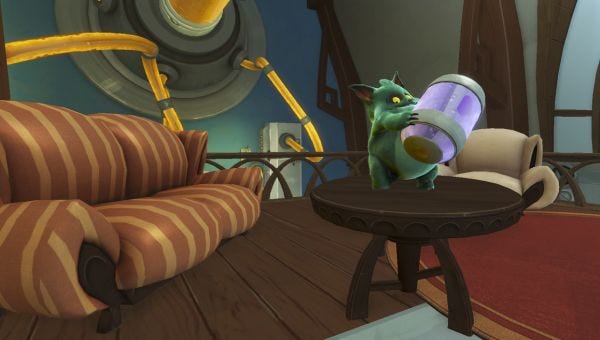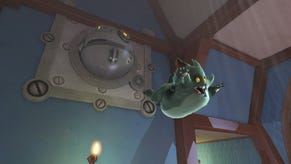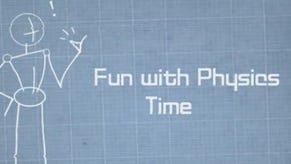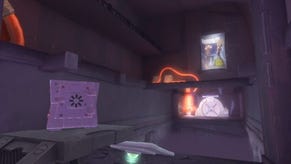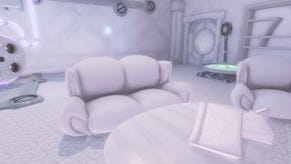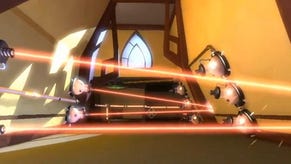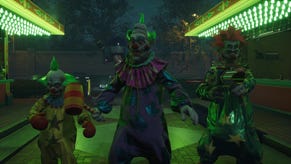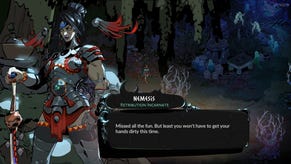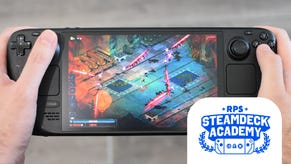Kim Swift: Quantum Condundrum, Small Budgets & Kids
Talking fluff.
At GDC last week, I grabbed the opportunity to sit down and chat with Kim Swift, Portal co-creator and project lead on the forthcoming first-person puzzler, Quantum Conundrum. We discussed the inevitability of comparisons with her previous hit, the constraints of making a game on a tight budget, and why kids are better gamers than we'll ever be.
RPS: So, Kim Swift, you made Portal didn't you?
Kim Swift: Really?! I did? Oh crap!
RPS: Okay, look, here's the dick question. What are you going to do about the inevitable comparison? Because this is a game with a series of chambers of puzzles in it. The comparison seems to become inevitable.
Kim: Yes. The comparison is inevitable. I don't really see that as a problem. It's a game within the same genre, but the gameplay is different. What you're doing in the game is vastly different. The mechanics are completely different. The sense of humour and the tone of the game is completely different. The art is completely different. It's like comparing Doom to Half-Life - yeah, they're in the same genre, but they're not the same game. It's one of those things, yeah, if you enjoy Portal you'll probably enjoy Quantum Conundrum, because it's challenging your brain to think in new ways that it hasn't really done before.
RPS: Can it be as good as Portal?
Kim: I dunno.
RPS: Can it meet the legend of Portal?
Kim: I don't know! I tried not to think about that. It was one of those things - we knew Portal would be good. But we didn't know how good, and we didn't know how it was going to be received. It's one of those things with any game that you work on - you want to try your best, and you do your best to make a good product. But at the end of the day, you never really know. It could be a smash hit, or it could be everyone thinks it's crap. [laughs]. I'm hoping that people will enjoy it! Everyone we've had test it and play with it so far has had a good time, and at the end of the day that's what I care the most about - our players having a good time. That's my job!
RPS: Are you working on the play-test/iterate model that you used at Valve?
Kim: Yes. Definitely. We run players through once a week to make sure that we haven't done anything immensely stupid. And fix problems that come up, generate new ideas based on people's reactions in play-tests, a very similar process.
RPS: So you're working on quite a small budget for the game.
Kim: Yes.
RPS: So why are so few others realising they can make games on low budgets?
Kim: I'm not sure. It's an interesting time in the game industry right now, because you're either a giant project that has gone through several iterations, it's the second or third in the series, so there's already a dedicated fanbase there, so people are willing to take more of a risk monetarily. Whereas doing new IPs is risky. You think you have a good idea, but you don't really know until it's out there. Starting small is a good way to test the market, to see if this genre is still viable and kicking for people.
RPS: How has that helped and hindered you?
Kim: Well, I've always been of the opinion that constraints are good. Whenever people are like, "Oh, it has to have this, this and this, and be in this timeframe, and take this much money," I don't see those as bad things. I see them as problems, potentially, but the best projects out there take their constraints and work within them, and take advance of the fact there's a constraint there. I think the scariest thing in the world for me would be someone saying, "Okay, here's a crap-ton of money. Do anything!" I'd be like, "Oh my God, I don't know what to do!" Having sky's the limit? I don't like that! I like, "Here's your box, play in your little sandbox."
RPS: There's been a lot of PR around the game, which I think is interesting. The development model feels very indie, but the PR has felt professional - revealing dimensions, drip-feeding the press. Has that been helpful, or has it been weird?
Kim: Um... helpful! For sure, because we're making a smaller game, it's actually been really neat to see we're getting similar press to larger box titles, and having that comparison, has been really positive for us. Because when people find out, oh, it's an XBLA title, it's a PSN title, it's a Steam title, they're like, "Oh, really, it's downloadable! That's cool." I think that's worked really in our favour.
RPS: When I played the game, I got the sense of its being a family game. Is that on purpose?
Kim: I dunno. I've always wanted to do a more cartoony game. We both love Day Of The Tentacle, right? It's one of our favourite games. So for me I miss the days when it was okay for a game to be stylised, and it wasn't considered to be a child's game. I miss that. And not to mention having a more stylised look to our game fits the gameplay. There's a fluffy dimension! Sure, we could do that in a realistically rendered Gears Of War style, but that would just be kind of strange. So for us we talked a fair amount at the beginning of development about what our art style was going to be, and we always kept landing back on over-the-top stylised Pixar-inspired graphics.
RPS: There's a reason I say "family" rather than "children's" game, because it doesn't look and feel like a children's game. But it feels like children could enjoy it.
Kim: Yes, for sure.
RPS: Is that part of your philosophy?
Kim: The more people that can enjoy a game the better. I grew up playing games with my dad, and I feel that as the games industry has progressed, there's less and less titles out there that are 'E for everyone' but still have challenges for adult hardcore players, as well as not having swear words for children. I miss those days, and I feel like there just aren't enough titles out there like that. So as much as possible for me, I want there to be that situation I had when I was a kid, where dad can sit down with ten year old kid and play a game together, switch back and forth the controller when something's more difficult. We actually had a few playtesters would be the dad and the daughter, and they would switch the controller back and forth, bicker at each other, and it was so great. It was exactly the experience I had growing up. That's what I want.
RPS: Do you think a part of that was a reaction of having come off developing Left 4 Dead 2? Something so intensely adult?
Kim: I dunno. Like I said, I've always wanted to do a more stylised game, and having the opportunity this time around, and everyone being cool with that, I'm, "Well, alright!"
RPS: So you don't get to rip anyone's arms off?
Kim: No, no. There's no arm ripping. Sorry.
RPS: I am a gamer and therefore I require horrendous violence at every turn.
Kim: Yeah, don't get me wrong, I love playing violent games! But I don't think it needs to be every game.
RPS: There does seem to be a direction games are heading in.
Kim: Also, something I've noticed is that people really underestimate kids and their ability to play games. I was watching an eight year old just rip through the game like nobody's business, and then I watched a hardcore first-person shooter player the next day, and the kid kicked his butt. Because kids these days are growing up with games, they're much better gamers than we are. And they're hard-wired to learn quickly. Kids are smarter than we think they are.
RPS: Thank you for your time.
